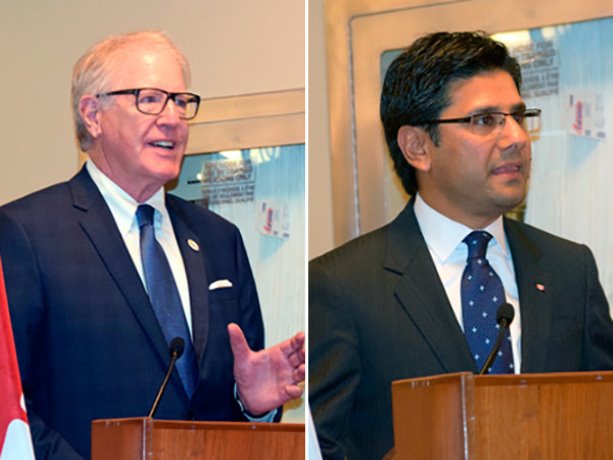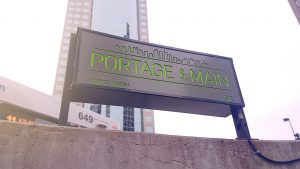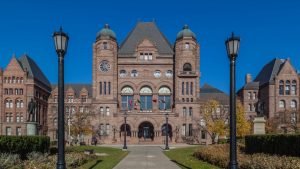Construction Lien Act reform in Ontario is not yet home-free said members of the Council of Ontario Construction Associations (COCA) attending the association’s Queen’s Park lobbying day Sept. 25.
And so, they said, there must be vigilance to ensure Bill 142, enacting long-sought reforms, achieves royal assent safely before the next provincial election.
Members attending a reception at Queen’s Park — following a day of meetings arranged between some 40 COCA members and members of the legislature from all parties — recalled two previous aborted attempts from private members to get prompt payment legislation approved, in 2011 and 2014. They expressed concern that Bill 142, introduced in May after two years of extensive consultation with stakeholders, may suffer the same fate.
The bill, which proposes a new prompt payment regime for payment of bills, modernizing the lien and holdback processes and the introduction of a dispute resolution mechanism in what would become a new Construction Act, was introduced by Attorney General Yasir Naqvi and given first reading approval.
Second reading debate was launched the week of Sept. 11 with debate taking up some five or six hours on Sept. 13 and 14. That delay, and other potential slowdowns, had COCA members concerned.
"The purpose of today was to hold the government’s feet to the fire to ensure that Bill 142 gets across the finish line before the end of the current session," said Ian Cunningham, COCA president. "There are less than 40 days of sitting left and the bill hasn’t passed second reading yet and we’ve got to go to committee, then there will be public hearings, clause by clause, amendments to be made, then it is reported back for third reading and royal assent, so it still has a long way to go."
Toronto Construction Association past chairman Romeo Milano laid out a worst-case scenario.
"The message that we gave to the Conservative members was, stop slowing it down," he said. "We have had the discussions, we have had the peer reviews, we have had the stakeholder meetings, there is no need to drag it out.
"The sense is, once we get through Christmas, the government will be in full election mode. They may not even recall the house, they may adjourn it and wait until spring. Before the house even sits they might call the election. So we feel that any legislation has to be passed by December or it won’t be passed."
Representatives from all three parties attended the COCA reception to reassure COCA members there was all-party support for the legislation.
Naqvi said in a short address, "I am confident that members from all sides will be supportive of this very important piece of legislation. As I said, our hope is that we pass second reading in the next week or two so that we can make whatever amendments we need to make so we can get it into the house for third reading debate and passage."
As of the morning of Sept. 28, second reading debate was continuing with the timing of a vote still undetermined.
Progressive Conservative MPP Mike Harris (Kitchener-Conestoga) pledged his party’s support, as did New Democrat Paul Miller (Hamilton East-Stoney Creek) from his party, but Miller raised a note of caution, suggesting delays could come in the public hearings after second reading.
"I am sure there are other parties out there that are trying to derail this process that will remain nameless, but I am sure the government realizes how important this is to our industry and the province to keep things going," he said.
Executive director of the Electrical Contractors Association of Ontario Jeff Koller, also on hand to lobby for COCA, expressed similar concern. He recalled how large contractors had hastily formed the Fair Payment Reform Coalition to oppose Bill 69, the Prompt Payment Act, in 2014 and suggested it could happen again.
The Liberal government withdrew Bill 69 in the face of criticism and instead promised to institute broader consultations that would earn more widespread support. Construction law experts Bruce Reynolds and Sharon Vogel were appointed by the government, consulted extensively and issued their report to the government in 2016. The legislation introduced by Naqvi in the spring closely mirrored the Reynolds/Vogel recommendations.
"That was in 2014," said Koller of the derailment of Bill 69. "Now it is 2017 and our members are still waiting upwards of 90 to 120 days to get paid."
"There could be some opposition coming when it goes to committee and we have public hearings. And we expect the opponents to do the same as they always have, they are the only people who would stand to benefit from not paying their bills."
Cunningham said in a follow-up message that the situation is significantly different from 2014 but still he was cautious as well.
"With Bill 142, every imaginable stakeholder has had the opportunity to provide input at all stages of its development," he said. "While my greatest fear is the unknown, the unexpected, I’m not aware of any organized opposition. It’s my hope that any individual or group who emerged out of nowhere at this late stage would be ignored unless they provided input that constructively improved the bill."











Recent Comments
comments for this post are closed